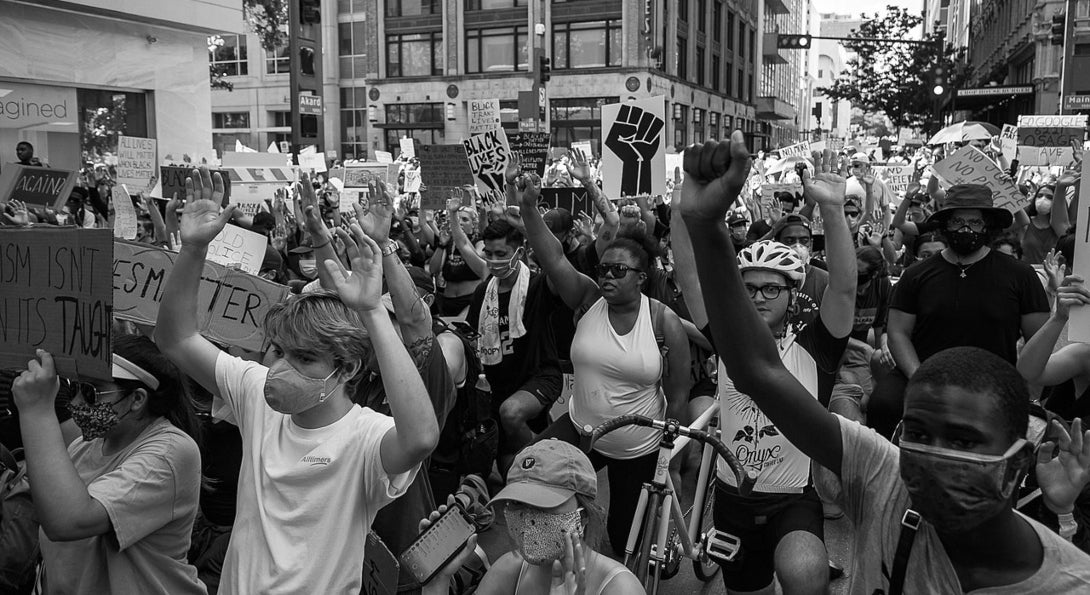Radical Public Health Response to Murder of George Floyd

Introduction
We, the members of Radical Public Health (RPH) at the University of Illinois-Chicago School of Public Health, stand in solidarity with Black communities across the country and the world. We are moved to write this statement after witnessing too many lives taken by racism––most recently Breonna Taylor, George Floyd, Ahmaud Arbery, Tony McDade, and Nina Pop, though there have been too many others who came before. We recognize that racism is a public health crisis , which affects individuals, communities, and societies, and leads to increased maternal mortality, premature deaths, increased risk of cancer, disinvestment in communities and schools, and so many other health injustices.
In many Western European and North American countries, Black communities are both disproportionately affected by the novel COVID-19 pandemic and targeted by increased surveillance and incarceration by police. Since the days of the slave patrol, the original police, Black communities have long suffered from structural racism and inequities including closures of schools and health clinics, racist policing, mass incarceration, and unfair sentencing in the justice system. Right now, RPH is focused on antiracism work that supports Black communities and dismantling the carceral system, which supports our mission to achieve health justice.
The American Public Health Association (APHA) released a statement in November 2018 recognizing law enforcement violence as a public health issue. We believe the institution of policing is harmful to health and support the APHA recommendations for actions by federal, state, tribal, and local authorities to:
- Allocate funding from law enforcement agencies to community-based programs that address violence and harm without criminalizing communities,
- Increase investment in promoting racial and economic equity to address social determinants of health,
- Fund programs that meet human needs, promote healthy and strong communities, and reduce structural inequities (economic, racial, and social) — such as employment initiatives, educational opportunities, and affordable housing—including by using resources currently devoted to law enforcement.
Selected quote
We join our voices with Black Lives Matter Chicago and other organizations to call for an end to policing, carceral system, capitalism, and punishment as a means of social control. We also call on all workers, unions, organizations, businesses, and government entities to both raise their voices and take concrete actions to end the oppressive system of policing. Because of this, we support those protesting the police and white supremacy even in this time of COVID-19. Fighting back against racism is absolutely essential to prevent further health inequities and to repair the health inequities that currently exist.
Statement text, continued.
We condemn the actions of Mayor Lori Lightfoot in Chicago in regards to enacting curfews , closing off transportation access to the downtown area, and putting important resources on hold, such as COVID-19 testing and CPS food distribution . These actions have direct, negative health impacts on resident’s lives, especially those in Black communities on the South and West sides. The instituting of curfews, especially with very short notice, justifies the arresting of large numbers of protestors. It is estimated that one in six COVID-19 cases in Illinois is linked to Chicago’s jails, thus arresting protesters will likely exacerbate COVID-19 cases in Illinois. The diminished CTA access further prevents movement of protestors, boxing them in for arrest. Mayor Lightfoot putting a hiatus on COVID-19 testing and food access, even temporarily, is dangerous punishment which could lead to further health injustices. The weekends of May 30th and June 6th, Mayor Lightfoot closed down transportation in central Chicago, restricting access for medical professionals and people in need of their services. The weekend of June 6th, Mayor Lightfoot hired a private security force to reinforce police presence. Given the violence on the part of law enforcement up to and throughout these protests, hiring unknown security forces with even less accountability than CPD, is extremely dangerous and threatens the safety of Chicago residents.
In conclusion, Radical Public Health stands in solidarity with the movement for Black liberation. We are advocating for an end to the carceral system and reinvestment in Black communities and people. For UIC, this includes defunding and removing police from UIC, ending UIC’s system of fearmongering crime reporting, and supporting mental health of students, faculty, staff, and community members. We encourage you to join us. While not everyone can be on the streets participating in protest, there are many ways to contribute to the cause and all are important. To find a way to join this movement please look at the resources here , to support Black Owned Chicago Business look here .
In Solidarity,
Radical Public Health
If you have any questions or want to get involved with Radical Public Health, please email us at rph.uic@gmail.com.